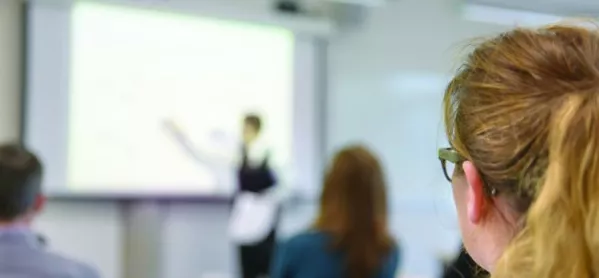- Home
- Exclusive: ‘Some will not pass’ chartered teacher test
Exclusive: ‘Some will not pass’ chartered teacher test

The Chartered College of Teaching has launched a pilot for a “demanding” teacher programme that it believes some candidates will fail to get onto at their first attempt.
Becoming a chartered teacher had to be “hard to achieve” to ensure it was “high status”, the college said. But its chief executive Dame Alison Peacock insisted that teachers would want to complete the programme, despite the high existing workloads.
Plans for chartered teacher status have been in development since the Chartered College of Teaching was formed in January.
The college has now opened applications for a pilot of the programme, which it says will be “the first step in the development of a career pathway focused on effective classroom practice, not leadership”.
There are places for 150 teachers on the 14-month pilot, which starts in January 2018.
College of Teaching assessments
To achieve chartership, candidates at the Chartered College of Teaching will have to complete a range of different assessments. These will include “rigorous written and oral assignments, completion of a professional development plan, participation in debate activities, a small-scale research or improvement project, and submission of a portfolio of videos of practice, work samples and reflections.”
Candidates will also have to attend four face-to-face training and assessment days and participate in a range of online activities.
Speaking exclusively to Tes, the college warned that achieving chartered status would not be easy.
“There’s a range of different assessments within it - it’s not one single, terminal assessment - and absolutely our expectation would be that there will be some people who will not pass all of those assessments the first time,” said Cat Scutt, the Chartered Teaching College’s director of education and research.
Ms Scutt said unsuccessful candidates would be able to “resit and resubmit” assessments, but might have to wait for a later cohort to do so.
“We wouldn’t expect everyone to achieve chartered status on their first attempt,” she said.
“It’s not something that you should feel that just because you’ve applied to do it, that means you’ll complete it.
“That would absolutely devalue the status - it’s got to be seen as something that is really high status and hard to achieve.”
While the programme will be testing, the college is confident teachers will want to balance it alongside their existing workload.
‘Moving beyond workload pressures’
Dame Alison told Tes: “I don’t think anyone has ever said that teachers are workshy.”
“I ultimately think this is a way of moving beyond the workload pressures, because when teachers are confident about their practice and can talk coherently about what they are doing, they are less likely to spend time carrying out tasks that might feel quite meaningless but because they feel they ought to.”
“If anything I think people would be more worried if they thought a new chartered status was too lightweight, than the route that we’ve taken which is actually quite demanding.”
The college expects to revise the programme following the pilot, and accept candidates for a second cohort in January 2019, with the intention of eventually moving to “multiple cohorts” starting at different times across a single year.
It will cost £850, but participants on the pilot will pay a reduced fee of £450.
Speaking more broadly about the work of the Chartered Teaching College, Dame Alison said she was happy with the progress it had made since January.
She pointed to the launch of its Impact journal, the creation of 63 local teacher networks and a research database for members as achievements.
Keeping teachers in schools
Dame Alison said she was “pleased” with the current membership of roughly 8,500 teachers, but admitted the organisation had much further to go.
“There are half a million teachers in England, plus the independent sector,” she said. “Ultimately this should be an organisation that a majority of teachers should wish to join and support.”
She said it would “take years to grow” a profile for the college as the voice of good pedagogy, but added: “we’re in this for the long game… it’s not all about flash in the pan quick wins.”
“We haven’t even been running for a year yet in our current form, so it would be extremely foolhardy for me to claim any impact on the wider profession,” she said.
“But I do think, together with appointment of colleagues such as Amanda Spielman at Ofsted, and our current secretary of state [Justine Greening], the rhetoric of supporting professionalism, greater trust, expectations of the importance of career pathways, flexible working - all the kinds of things that will keep the best teachers in our schools - the narrative of that is beginning to shift in a much more positive way.”
Want to keep up with the latest education news and opinion? Follow Tes on Twitter and like Tes on Facebook
Keep reading for just £1 per month
You've reached your limit of free articles this month. Subscribe for £1 per month for three months and get:
- Unlimited access to all Tes magazine content
- Exclusive subscriber-only stories
- Award-winning email newsletters



